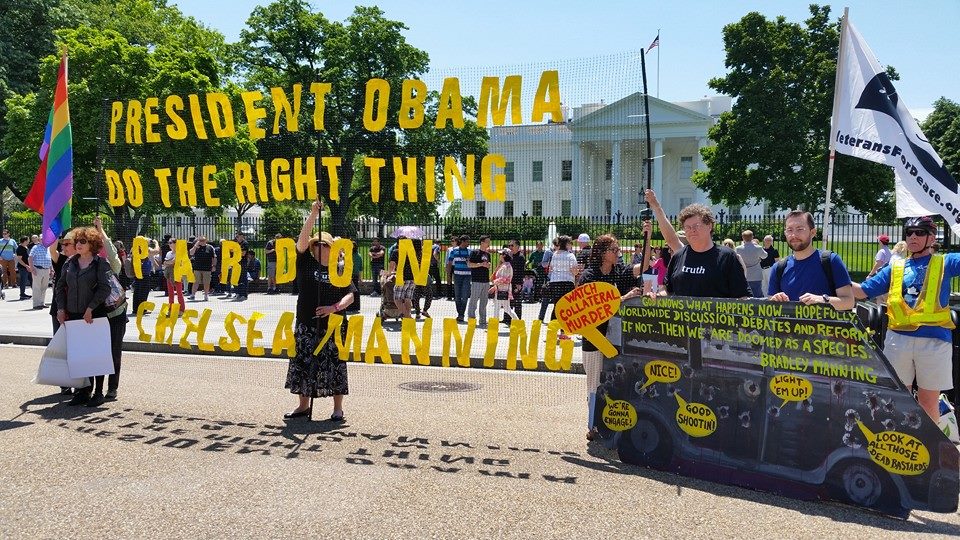During the dwindling days of his term, President Obama granted an unprecedented number of clemencies to over 330 inmates, including former military intelligence analyst Chelsea Manning. Prosecuted for leaking classified military documents, Manning was handed a thirty-five year sentence in 2013. But after Obama’s commutation, her sentence has been drastically shortened, and she will now be released this upcoming May. This announcement represents the former administration’s push for criminal justice reform, with Obama granting clemency to a total of 1715 inmates throughout his presidency, more than any other U.S. President. But despite Obama’s record, Manning’s commutation comes as a surprise to many, especially in light of Obama’s crackdown on whistle-blowers.
The Obama administration investigated and convicted more people for leaking vital government information than all other U.S. Presidents combined. Using the Espionage Act, a relic from World War I intended to silence dissenters, the administration prosecuted eight federal officials who brought up concerns with government actions. In one such case, Thomas Drake claimed that he attempted to raise issues with the mass surveillance of civilians through “official channels,” but was met with fierce resistance. Drake was fired from his position, arrested by FBI agents, and charged with enough crimes to keep him imprisoned for life.
Chelsea Manning, previously Bradley Manning, was also convicted of leaking information under the Espionage Act. In July of 2013, a military court issued Manning a thirty-five year prison sentence for passing on intelligence about military and diplomatic affairs to the Internet site WikiLeaks. The leaked intelligence included footage of a helicopter killing 12 civilians in Baghdad, and private communications from Diplomatic officials. Much to the chagrin of the U.S. government, WikiLeaks proceeded to publish this information on its website for public viewing. While these documents have not been proven to be a cause of direct harm, some sources attribute the uprisings of the Arab Sprint to this exposed information.
During her trial, Manning was charged with 22 offenses, including the infamous accusation of “aiding the enemy,” a charge that carries the death penalty if convicted. Manning was later acquitted of this, most serious, charge, but many are troubled that she ever faced it. According to Manning’s attorney, David Coombs, the prosecution’s decision to bring the charge posited the administration’s view that “leaking information to the press is tantamount to aiding the enemy,” an opinion that, in Coombs’ words, “should send alarms to all journalists.” Manning argued she never meant to harm the United States, but instead sought to spark a debate about the morality of U.S. involvement in Iraq. Several of her supporters summarized her position on her website:
“After a heart-wrenching instance of civilian casualties on Christmas Eve, 2009, Manning struggled with the morality of what he [sic] saw in Iraq, eventually coming to the difficult choice to selectively release documents illustrative of the wars in the Middle East and underhanded foreign policy he [sic] believed would not jeopardize the safety or mission of his [sic] fellow troops.”

Despite Manning’s narrative that she leaked information for the betterment of the country, an argument closely resembling that of former NSA contractor Edward Snowden, the court punished Manning with a lengthy thirty-five year sentence. Many organizations and individuals contested the excessive nature of Manning’s sentence because of her attempt to reveal the truth. In a letter to President Obama, Human Rights Watch not only supported the commutation of Manning’s sentence, but also lamented the “disproportionate nature of this sentence, which exceeds any other for U.S. prosecutions of offenses related to the leak of sensitive information.” The American Civil Liberties Union shared this sentiment. Upon hearing Manning’s original sentence, director of the ACLU’s Speech, Privacy, and Technology project Ben Wizner commented: “This is a sad day for Bradley Manning, but it’s also a sad day for all Americans who depend on brave whistleblowers and a free press for a fully informed public debate.” Through media attention and awareness raised by civil rights group, Manning’s situation began to build a network of public support.
Manning’s support network continued to gain traction after news of her sentence broke out. A day later, she announced that she no longer wanted to identify as Bradley Edward Manning, but rather as Chelsea Elizabeth Manning. LGBT groups stood behind Manning in her struggle to transition into womanhood. As pressure on the military from these groups grew, Manning was gradually provided additional treatment to assist her progress. She was given female undergarments and cross-sex hormone therapy as well as voice therapy to feminize her tone. Manning, content with the nature of her treatment commented, “There have been significant changes since I’ve been taking the hormones, and I am happy with them.” The global support Manning has received has been instrumental in influencing the military to provide treatment for her gender transition, as well as her eventual campaign for commutation.
In the waning months of the Obama presidency, with criminal justice reform nowhere to be seen on the horizon, the administration focused on granting clemencies to unfairly imprisoned individuals, focusing on non-violent drug offenders. But Manning’s support network mobilized to pressure the President into commuting her sentence. A White House petition to reduce Manning’s sentence accumulated over 100,000 signatures over the course of a month. Additional civil rights groups furthered their support through letters written to the President in support of commutation, as well as a Twitter campaign that promoted the hashtag “Hugs for Chelsea.”

Advocacy by Manning’s supporters translated into victory on January 17, when President Obama commuted Manning’s sentence, a stark contrast to his typically strict policies about whistle-blowers. His action begs the question: was Manning’s case a rare instance of leniency under public pressure, or a profound shift in the government’s perspective towards whistleblowers? With a new administration in place, this question will be answered by President Trump. But if Trump’s tweet criticizing Manning as a traitor is any indication, the new administration will likely not be sympathetic towards future whistleblowers.

